2013年高考英语第一轮复习导航[人教选修八]
- 格式:doc
- 大小:702.50 KB
- 文档页数:73
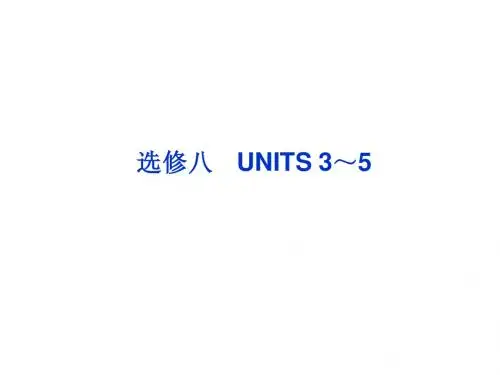
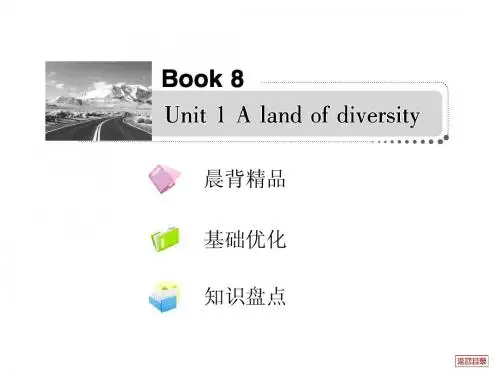
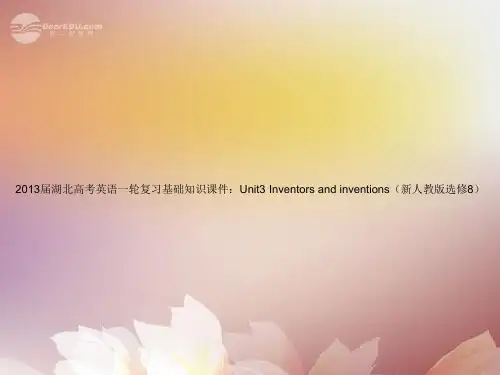
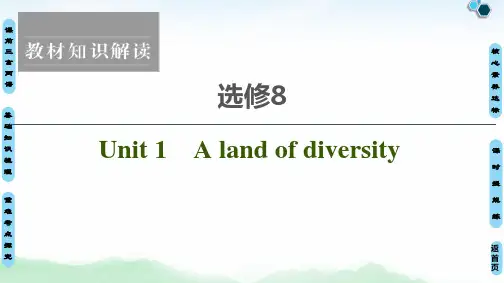
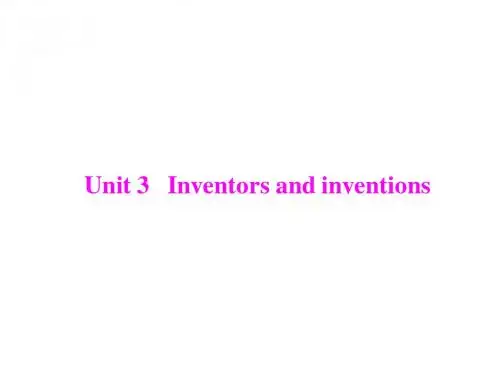
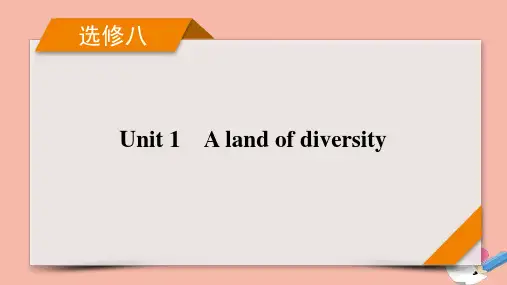
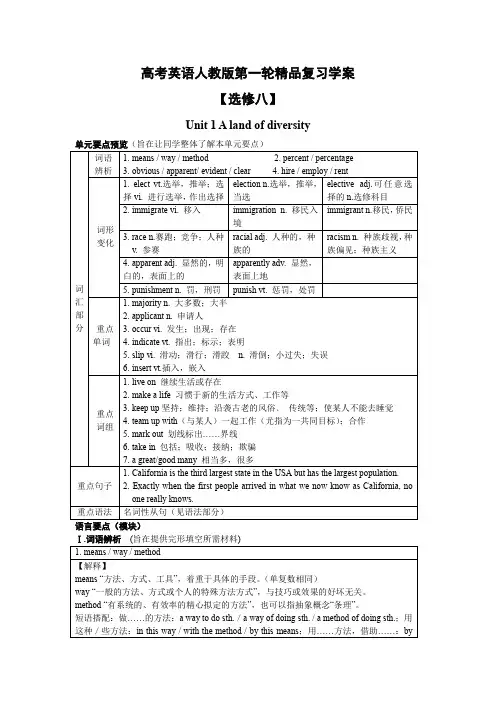
高考英语人教版第一轮精品复习学案【选修八】Unit 1 A land of diversity语言要点(模块)Ⅲ.重点词汇(旨在提供词汇综合运用所需材料)1.majority n.大多数;大半major adj.&n.较大的,主要的;主修,专攻(反义词minority少数;少数民族)[典例]1). A / The majority of doctors agree that smoking is extremely harmful to health.大多数医生认为吸烟对健康极为有害。
2). The majority was/were in favour of the proposal. 多数人赞成这个建议。
[重点用法]be in the/a majority 构成大部分/大多数 a majority over sb 超过对方的票数[练习] 按要求填空或翻译。
1). English speakers form the ________ (大多数) of the population.2). Among the members of the mittee those who favour the proposed changes are _______ (介词)the majority.3). They had a large majority _______ (介词) the other party at the last election.4). The majority of people _________ (prefer) peace to war.5). The majority of the damage _________ (be) easy to repair.2. applicant n.申请人application n.申请(书);应用;用途apply v. 申请;运用,适用[典例]1). We had 250 applicants for the job. 有250人申请这份工作。
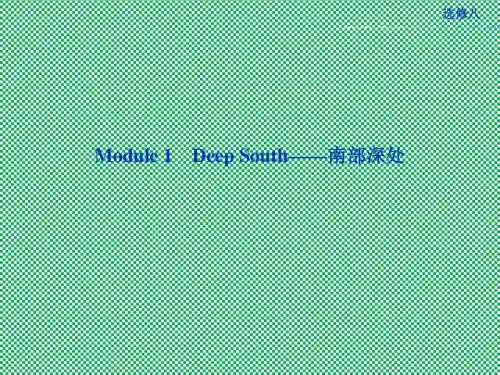
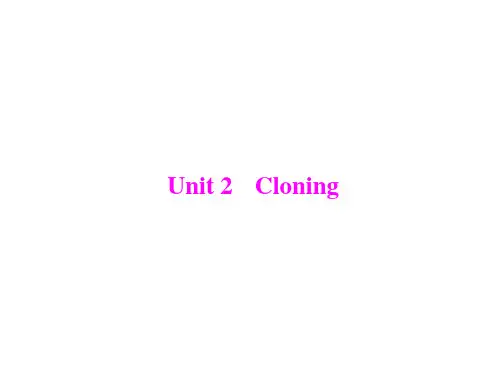
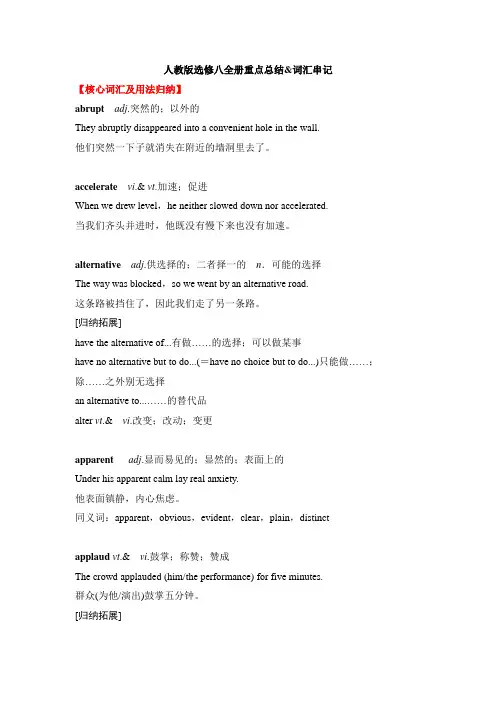
人教版选修八全册重点总结&词汇串记【核心词汇及用法归纳】abrupt adj.突然的;以外的They abruptly disappeared into a convenient hole in the wall.他们突然一下子就消失在附近的墙洞里去了。
accelerate vi.& vt.加速;促进When we drew level,he neither slowed down nor accelerated.当我们齐头并进时,他既没有慢下来也没有加速。
alternative adj.供选择的;二者择一的n.可能的选择The way was blocked,so we went by an alternative road.这条路被挡住了,因此我们走了另一条路。
[归纳拓展]have the alternative of...有做……的选择;可以做某事have no alternative but to do...(=have no choice but to do...)只能做……;除……之外别无选择an alternative to...……的替代品alter vt.& vi.改变;改动;变更apparent adj.显而易见的;显然的;表面上的Under his apparent calm lay real anxiety.他表面镇静,内心焦虑。
同义词:apparent,obvious,evident,clear,plain,distinctapplaud vt.& vi.鼓掌;称赞;赞成The crowd applauded (him/the performance) for five minutes.群众(为他/演出)鼓掌五分钟。
[归纳拓展]applaud sb for...因……而赞赏某人applause n.[U]鼓掌欢迎;喝彩win the applause of赢得……的掌声arrest vt.逮捕;扣留;吸引;阻止n.逮捕After the match three youths were arrested.比赛过后有三个青年被捕。
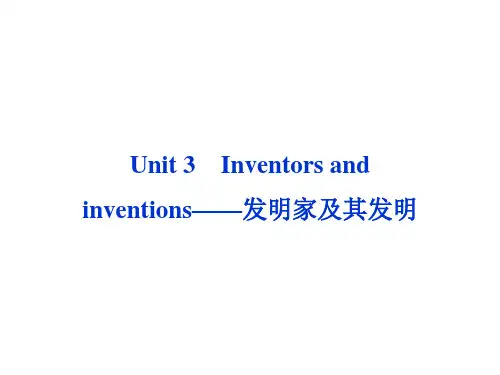
高考英语一轮复习单元总复习新人教版选修8Ⅰ.单词拼写1.Anything that is dropped falls towards the ground because of the force of ________(引力).答案:gravity2.The little child gave a strong________(拉)at the rope but the sheep didn’t move forward at all. 答案:pull3.The water in the harbor was not deep enough to ________(浮动)such a big ship.答案:float4.He is one of the________(生物学家)who have advanced a new theory of life.答案:biologists5.The________(气候)of southern Florida attracts thousands of tourists each winter.答案:climateⅡ.完成句子1.既然你长大了,就不应该依靠你的父母了。
(now that)________________________________________________,you should not depend on your parents.答案:Now that you have grown up2.你知道第二次世界大战是何时爆发的吗?(break out)Do you know when the Second World War ________________?答案:broke out3.我们现在生活在所谓的信息时代。
(what)We now live in __________________the Information Age.答案:what is called4.他力图解最难的题目以显示他的聪明。
选修八Unit 1 A land of diversity语言要点(模块)Ⅰ.词语辨析(旨在提供完形填空所需材料)Ⅲ.重点词汇(旨在提供词汇综合运用所需材料)1.majority n.大多数;大半major adj.&n.较大的,主要的;主修,专攻(反义词minority少数;少数民族)[典例]1). A / The majority of doctors agree that smoking is extremely harmful to health.大多数医生认为吸烟对健康极为有害。
2). The majority was/were in favour of the proposal. 多数人赞成这个建议。
[重点用法]be in the/a majority 构成大部分/大多数 a majority over sb 超过对方的票数[练习] 按要求填空或翻译。
1). English speakers form the ________ (大多数) of the population.2). Among the members of the committee those who favour the proposed changes are _______(介词) the majority.3). They had a large majority _______ (介词) the other party at the last election.4). The majority of people _________ (prefer) peace to war.5). The majority of the damage _________ (be) easy to repair.Keys: 1). majority 2). in 3). over 4). prefer / prefers 5). is2. applicant n.申请人application n.申请(书);应用;用途apply v. 申请;运用,适用[典例]1). We had 250 applicants for the job. 有250人申请这份工作。
2). As the wages were low, there were few applicants for the job. 因为工资低, 没有什麽人申请这份工作。
[重点用法]apply for... 申请……apply to... 适用……fill in the application form for sth. 填写……申请表[练习] 根据句子的要求在括号里填入适当的词或翻译。
1). Successful _________ (apply) will receive notification within the week.2). This r ule can’ t be applied ________ (介词) every case.3). You should ________ ________(申请) the job immediately, in person or by letter.4). The question in the second half of the form _________ ________ (适用) married men only. Keys: 1). applicants 2). to 3). apply for 4). apply to3. occur vi. 发生;出现;存在[典例]1). The tragedy occurred only minutes after take-off. 这一悲剧在起飞后几分钟内就发生了。
2). Didn’ t it occur to you that he might be late? 你当时没有想到他可能会迟到吗?[重点用法]occur to... (主意) 浮现于脑海中;被想到;被想起;(某人)想到……[练习] 根据句子的意思填空或翻译。
1). The possibility that she might be wrong never even ________ ________ her.2). A good idea _______ _______ him.3). ___________________________________ (他从没想到) he might be falling in love with her. Keys: 1). occurred to 2). occurred to 3). It had never occurred to him that4. indicate vt. 指出;标示;表明indication n. 指出;表明indicative adj.指示的;暗示的[典例]1). I asked him where my sister was and he indicated the shop opposite. 我问他握姐姐在哪,他指指对面的商店。
2). Research indicates that men find it easier to give up smoking than women. 研究表明男人感到比女人更容易戒烟。
[重点用法]indicate sth (to sb) 指示;指出;标示indicate that/wh-表示……;示意……[练习] 根据句子的意思,在括号里填入适当的词。
1). The government has ________ (表明) that it intends to cut taxes.2). A flashing red light ________ (标示) that a stretch of road was undergoing repairs.3). There is every ________ (indicate) of a change in the weather.Keys: 1). indicated 2). indicated 3). indication5. slip vi.滑动;滑行;滑跤n. 滑倒;小过失;失误slippery adj.滑溜的[典例]1). My foot slipped and I nearly fell. 我的脚一滑,差点跌到。
2). She slipped into the room when no one was looking. 她趁无人注意的时候溜进了房间。
[重点用法]let slip... 错过……;无意中说出let sth. slip through your fingers错过(机会),失去(机会)a slip of the tongue 口误[练习] 根据句子的要求在括号里填入适当的词或翻译。
1). She ________ ________ (无意中说出) that she was intending to leave the company.2). As the years _________ by, I thought more and more about him.3). Drive very carefully; the roads are wet and ________ (slip).Keys: 1). let slip 2). slipped 3). slippery6. insert vt.插入,嵌入[典例]He inserted a key into a lock. 他把钥匙插进锁中。
[重点用法]insert sth (in/into/between sth) 插入、放入、置入或嵌於某物或某两物间[练习] 根据句子的要求在括号里填入适当的介词。
1). She inserted an additional paragraph ________ an essay.2). Insert your fingers ________ the layers and press them apart.Keys: 1). in 2). betweenⅣ.重点词组(旨在提供综合运用所需材料)1. live on 继续生活或存在[典例]She lived on for many years after her husband died. 丈夫死後她继续活了多年。
[短语归纳] live短语:live on sth 以某物为食;靠某种经济来源生活live by doing sth 靠做某事物为生live for sth 以某事物为生活目标live through sth 经历某事物而幸存live together 在一起生活;同居live up to sth 依照某事物行事;表现出符合某事物的标准live with sth 接受或容忍某现象live to be... = live to the age of... 活到……岁live a... life 过着……的生活[练习] 根据句子的意思在括号里填入适当的live短语。
1). The lonely old man _______ _______ charity.2). Mozart is dead but his music _______ _______.3). My grandfather _______ _______ both world wars.4). We should work hard and try to _______ _______ _______ our parents’ expectations.5). The brave girl is learning to _______ _______ her disability.Keys: 1). live on 2). lives on 3). lived through 4). live up to 5). live with2. make a life 习惯于新的生活方式、工作等[典例]They settled down in Canada and made a life for themselves. 他们在加拿大定居下来,习惯新的生活方式。
[短语归纳] life短语:bring sb/sth (back) to life 给某人/事物的活力;使复活lay down one’ s life (for sb/sth) 为……献身;牺牲生命lead a dog’ s life 过狗一般的生活(长期忧虑、痛苦或悲伤)make one’ s way in life 在生活中有所成就take one’ s (own) life: commit suicide 自杀put an end to one’ s life: kill oneself 自杀take sb’ s life: kill sb 取某人性命a/sb’ s way of life(某人的或某些人的)生活方式a walk of life 行业;职业;阶层to the life 逼真end one’ s days/life (i n sth)(处於某状况下或在某处)度过余生[练习] 根据句子的意思在括号里填入适当的介词或翻译。